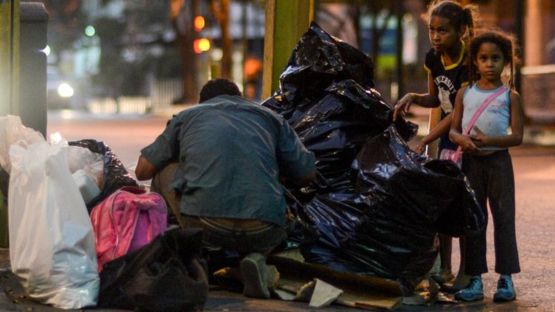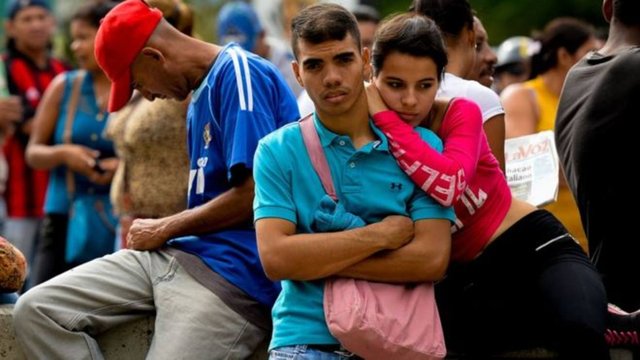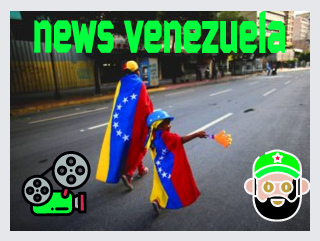How does Venezuela get out of the crisis? The vision of three economists
Increase the price of gasoline? Ask the IMF for help? Renegotiate the debt? A drastic change of model? A little over a week before the presidential elections, we asked three economists what the government should do to change the course.

There are only six words, but they hide a great enigma: how does Venezuela get out of the crisis?
A little over a week before the presidential election on May 20 is the million dollar question.
Venezuela suffers the highest inflation in the world and the high prices and continuous escalation adds to the shortage of certain foods, medicines and basic products.
President Nicolás Maduro affirms that, if he is re-elected, he will take measures to combat what he considers an "economic war" and inflation "induced" by the oligarchy, the United States and the International Monetary Fund (IMF).
For their part, liberal economists criticize, among other things, government controls, such as the exchange market, and the collapse of state-owned companies such as PDVSA, the country's main source of income.
A good part of the opposition considers that there are no fair conditions to hold the elections on May 20 and call not to participate.
But candidate Henri Falcón does want to propose a battle and proposes to dollarize the economy and ask for financial assistance from multilateral organizations.
"It's a struggle between socialism as a future and capitalism as a zombie that refuses to die," says Maduro a few days before the elections.
We questioned three economists with different views.
While Anabella Abadi and Asdrúbal Oliveros present a liberal and critical position with the government and propose a radical change, Guillermo Oglietti encourages a "heterodox" policy away from the "neoliberal" model.
"An unorthodox economic policy"
Guillermo Oglietti, PhD in Economics and researcher at Celag (Latin American Geopolitical Strategic Center). (The director of the center, Alfredo Serrano, is an economic adviser to the government of Nicolás Maduro).
The economist affirms that since the beginning of the 21st century Venezuela sails "against the economic trend because it decided, not only its government but mainly its people, that the road was not the neoliberal model".
"The policy of redistribution to guarantee social rights thanks to the recovery of oil sovereignty has been key in this period," he adds.
According to Oglietti, the "international actors who enjoyed the Venezuelan oil rent reacted against in the form of attempted coups (see 2002) or as it is happening now, in the form of international economic and financial aggression to achieve what the moment they have not been able to do it through the electoral route ".
For the economist, "inflation is the main symptom of the current economic problems and its causes must be addressed".
"There the neoclassical proposals fail, such as dollarization, austericide and convertibility," he says.
"The only possible way is a comprehensive heterodox economic policy that consolidates a broad productive structure with high added value, avoiding excessive concentration of supply, improving distribution channels, building an efficient and transparent exchange system, and that prevents any kind of speculation. "
The economist highlights as "formidable instrument" the petro, the cryptocurrency created by the Venezuelan government backed by the country's natural resources.
"Simultaneously, it provides fresh financing, breaks the blockade, stimulates exports and challenges the US dollarization business by creating a competitive currency," he explains.
In addition, in the fiscal plan proposes to increase "public revenues through instruments such as electronic invoicing and taxes on large fortunes and large speculative transactions."
It also proposes to improve the management and stimulate the production of public companies and a "price policy that allows the recovery of the citizen's income".
On June 4 a new family of notes will be introduced in Venezuela, the sovereign bolivar, which will mean the elimination of three zeros. In this sense, Oglietti hopes that "the new currency does not inherit the reputation of the strong bolivar".
The economist also proposes "resuming the agenda of debt renegotiation and easing the pressure of short-term maturities."
Oglietti expects stability after the election. "Because inflation in Venezuela, as in the Chile of (Salvador) Allende, replaces the inability of the right to win elections legitimately," he says.
"Confidence, discipline and private initiative"
Anabella Abadi is an economist and analyst of Environment and Public Management
The economist is critical of what she describes as "distorting economic policies" of Maduro's government.
"They have resulted in the destruction of price signals, which makes it impossible to distinguish the expensive from the cheap, and in an opaque and volatile exchange market in which the same dollar has a dozen reference prices."
The government exercises exchange control. Given the scarce sale of dollars to the private sector, it has turned to the black market, where the dollar costs ten times more. The devaluation of the bolivar leads to a high demand for the US currency.
Among its proposals is "cut subsidies to public services and gasoline," which is virtually free in an oil country like Venezuela.
The measure, which would be very unpopular, could even be taken by Maduro if he is re-elected.
Abadi speaks of compensating for these cuts with "compensatory transfers from the government to the pockets of Venezuelans, for which international financial support and the restructuring of the foreign debt would be necessary."
These proposals are also considered by the economic program of the candidate Henri Falcón.
The aid of international organizations is rejected by Maduro, who even blames the International Monetary Fund for "economic war" and "induced inflation".

The economist considers three key aspects in the reforms:
• Generate an atmosphere of trust. For this, he asks "promote productivity and transparency through the timely publication of official statistics that allow monitoring of economic policies." The government has not published inflation figures since December 2015.
• Promote fiscal discipline. "In order to contain inflationary pressures, public expenditure must be contained in a disorderly and arbitrary manner," Abadi affirms.
• Respect for private initiative. Abadi calls for "the gradual dismantling of labor controls and regulations that have been suffocating Venezuelan producers and that have discouraged potential investors."
"Gradual decrease in oil dependence"
Asdrúbal Oliveros is director of the firm Ecoanalítica. He participated as an advisor to the opposition in the last round of negotiations with the government in the Dominican Republic....
Oliveros, critical of the government, believes that the solution "goes through a profound and drastic change of the model applied in the last decades, a 180 degree turn".
The economist believes that the first step is to create a "sound macroeconomic environment".
"The crisis in Venezuela has its origin in the systematic imposition of a model of social domination, in which the State has replaced the citizen and the markets as a mechanism of social organization," criticizes Oliveros.
"Venezuela should focus on the production of tradable goods and services, on decentralization in decision-making, on fiscal transparency, on the diversification of investment opportunities and on the gradual reduction of dependence on oil," he explains.
The economist also calls for respect "to private property and other political, civil and economic freedoms."
Last week the government announced the 90-day intervention of Banesco, the country's largest private bank, for alleged irregular operations.
Like Abadi, Oliveros believes that a "transparent" fiscal management and the promotion of "private productive activity" are necessary.
And it asks for the elimination of price control and unify markets and exchange mechanisms.
"In order to lay the foundations for reconstruction, Venezuela needs to resort to all possible financing mechanisms, including multilateral banking," says Oliveros, who specifically talks about "attracting investments in key areas such as oil"

Congratulations! This post has been upvoted from the communal account, @minnowsupport, by newsvenezuela from the Minnow Support Project. It's a witness project run by aggroed, ausbitbank, teamsteem, theprophet0, someguy123, neoxian, followbtcnews, and netuoso. The goal is to help Steemit grow by supporting Minnows. Please find us at the Peace, Abundance, and Liberty Network (PALnet) Discord Channel. It's a completely public and open space to all members of the Steemit community who voluntarily choose to be there.
If you would like to delegate to the Minnow Support Project you can do so by clicking on the following links: 50SP, 100SP, 250SP, 500SP, 1000SP, 5000SP.
Be sure to leave at least 50SP undelegated on your account.